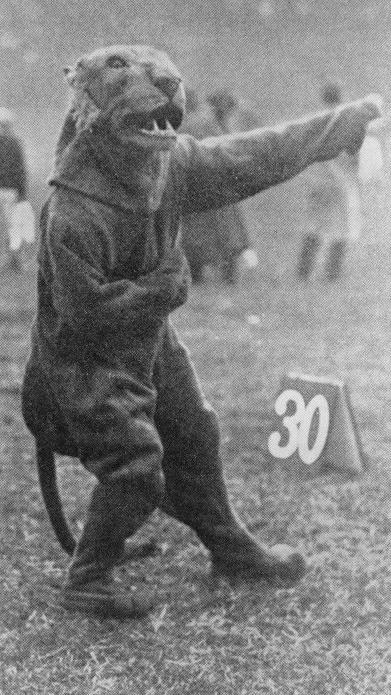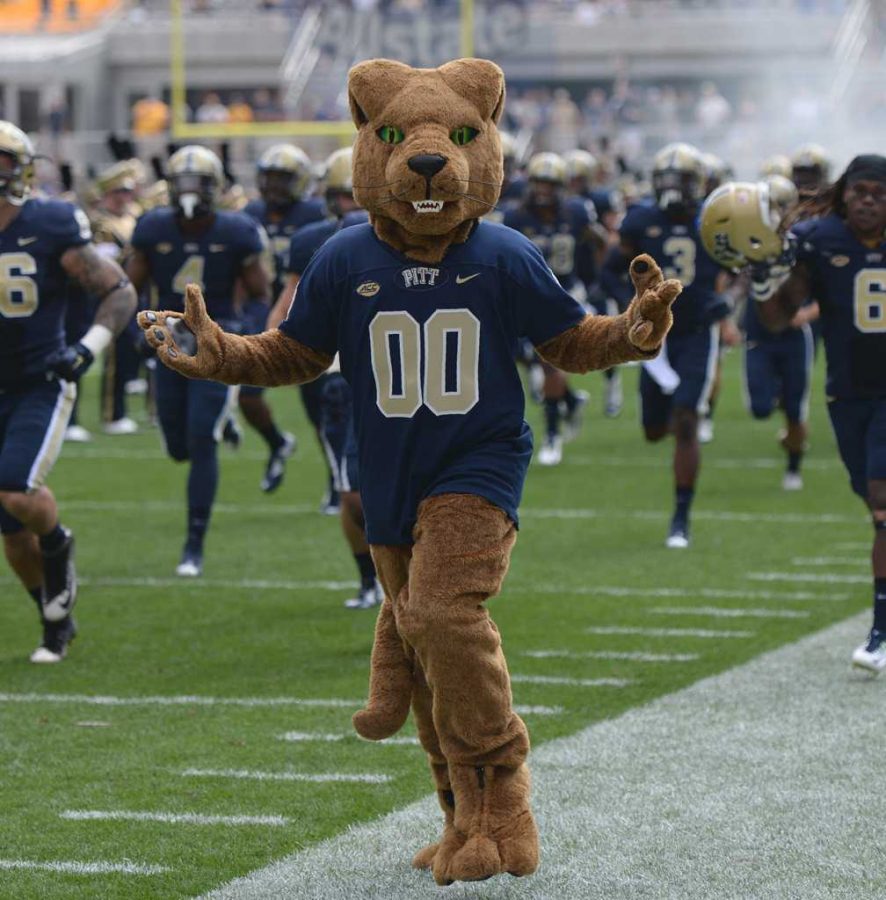We see him everywhere. At football games, in ads, on social media and in front of the Cathedral. His image is synonymous with Pitt Athletics and school pride — we call him Roc the Panther — yet his true identity is a closely-guarded secret.
Theresa Nuzzo, coach of the cheerleading and dance team, said Pitt keeps mascots’ identities secret “to stay true to the mystery of the character, demonstrating loyalty and commitment to the University.”
Although it might seem superfluous, the current Roc said this is common practice at most universities.
“You’re playing this larger-than-life character, and people want to be able to pretend that he’s real,” he said. “That becomes way harder when people know who the guy is in the suit.”
George M. P. Baird, a student who graduated in 1909 and wrote the lyrics to Pitt’s Alma Mater, first suggested Pitt adopt the panther as its mascot, which was once indigenous to the Pittsburgh region.
The animal’s dark hue also matched Pitt’s school colors, blue and gold, and no other college or university had the panther as their mascot at the time.
Since the University opened, Nuzzo said more than 100 students have played Pitt mascots.
Before the panther, Pitt’s athletic teams were known as the ‘whups,’ after the University’s former name, Western University of Pennsylvania (WUP). Pitt adopted the panther as its mascot one year after the University changed its name in 1908.
In the 1990s, Pitt named its mascot Roc in honor of Steve Petro, a former Pitt football player, coach and athletic department assistant nicknamed The Rock because “he was said to be the foundation that Pitt football [built itself upon],” Nuzzo said.
Before this year, Roc hopefuls would only have one tryout a year in April to prove themselves — this year, though, there will be an additional one in mid-October in order to cover more events.
The Roc application requirements are straightforward — applicants must be between 5-foot-8 and 6-foot-2, and have certain qualities like athleticism, natural rhythm and confidence. The Roc must be comfortable in front of crowds and have the ability to think on his feet, according to the current Roc.
The current Roc has held the position for two years after a friend on the dance team told him to come to Roc tryouts when he was a sophomore. In high school, Roc was active in theatre and sports, which prepared him for the demanding physical parts of the job.
“I definitely think that the confidence I’ve gotten from performing, the basic level of conditioning I have from playing sports and the understanding I have of the games because of my love of sports have all helped me a lot [to be Roc],” he said.
After one or two new potential Rocs pass the tryouts, it’s time to learn the ropes. The hopeful Rocs act as handlers for a year, helping and observing the mascot to learn the mannerisms and persona. After six months, they get into the costume and practice at smaller events like parties and on-campus promotions.
Then, the rookies measure themselves up to other school mascots at a National Cheerleaders Association camp in August.
After training at the Myrtle Beach camp, they graduate to the “Main Roc” role and perform at bigger events like football and basketball games. According to Nuzzo, there are always other Rocs working toward taking over the position of “Main Roc,” who is either a senior or leaving the program.
“There are universities who have five, six, seven people that hold the same position,” Nuzzo said, “[but] we’ve never developed that system, and I don’t think we will … Roc’s character is very unique and is more life-like than many, so you need that time to develop yourself.”

Developing the Roc mentality comes with practice, but once the performer captures it, everything else comes naturally.
“It’s all muscle memory at this point. I know how he behaves … and it’s weird I’m saying ‘he’ but when you put it on, it’s like a whole new persona,” the current Roc said. “But that’s been freeing in a lot of ways because I don’t have to think about it, so I can just go out and have a blast and do as much crazy, fun stuff as I can.”
In order to get to that point though, each Roc has to first get used to the costume.
The suit weighs about 20-30 pounds, and sometimes Roc must perform in extreme conditions.
“I remember the Delaware game last year was brutal,” he said. “It was 90 degrees, and I’m doing an hour and a half of pregame and then running the team out and then an entire football game.”
Roc gets to Heinz Field five hours before kickoff, when most other students are still sleeping. As the cheerleaders prep, Roc stretches, drinks a lot of water, and listens to music.
Two and a half hours before kickoff, he gets into the suit, out into the parking lot for the tailgate festivities, and then walks the team into the locker room when they arrive. Then, it’s the March to Victory parade, where Roc, the cheerleaders and the band march from PNC Park to Art Rooney Avenue near Heinz field.
Then, he has a short break, runs the band onto the field, the national anthem is played, runs the team onto the field, and finally, kickoff. After that, it’s “standard gameday procedures,” like hyping up the crowd and interacting with the cheerleaders.
Although rigorous, being Roc has its perks. The biggest one, Roc said, is traveling.
“I get to go to every away football game, I get to go to a bunch of tournaments, I get to do a lot of stuff with the other ACC mascots, so I basically get to go on trips all across the country for free, which is awesome.”
Roc has also met Pitt legends like Aaron Donald, Larry Fitzgerald and Tony Dorsett, along with former Panther mascots.
“I’d say I’ve had around 10 different guys come up to me and tell me they used to be Roc. It’s cool that they’re still so involved and passionate about Pitt,” he said. “I can’t wait to be the old guy telling Roc ‘back in my day’ stories 30 years from now.”


